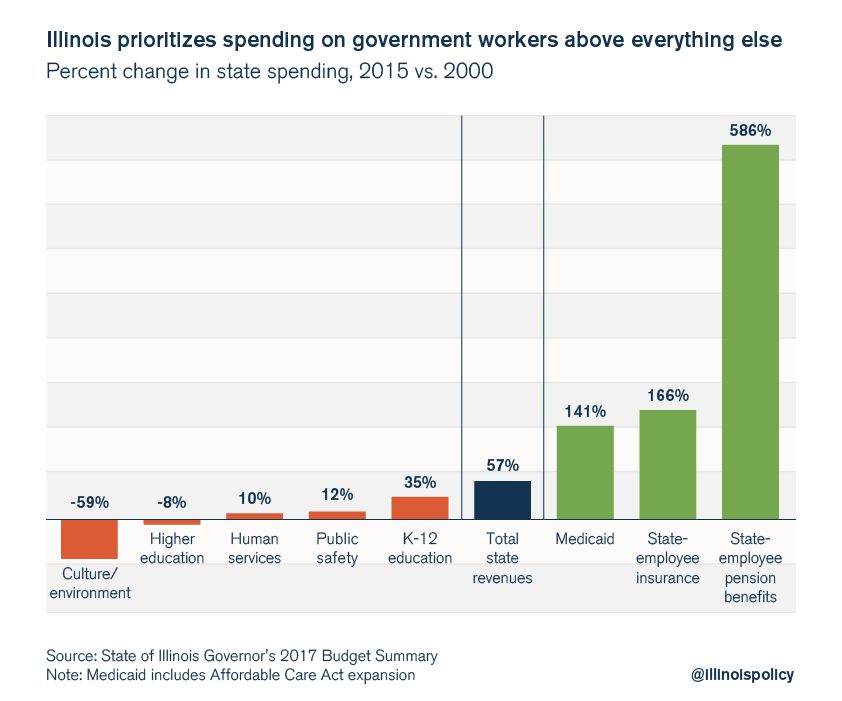Poll results show only 1/3 of Illinoisans say they’ve been affected by the budget impasse
Forty percent of respondents to a newly released statewide poll blame the government for poverty. Poll results also show that Illinoisans feel insecure about jobs and education, in addition to frustration with government dysfunction.
Illinoisans are well aware of their state government’s dysfunction, and while some are feeling the effects of the lingering budget impasse, most residents are suffering the long-term consequences of a state that prioritizes special interests above taxpayers and those who rely on social services to get by.
These truths are affirmed by results from a Paul Simon Public Policy Institute poll released March 24, which outlines state residents’ sentiments on subjects ranging from the Affordable Care Act to poverty to jobs.
The poll results bring to life the insecurity Illinoisans are feeling every day.
Thirty-three percent of Illinoisans surveyed said the budget impasse has affected them or an immediate family member; 62 percent said it has not. Interestingly, of those who said they have been affected, the perception is that “it [has] resulted in K-12 funding cuts, job loss and cuts to needed social services.” In 2015, the General Assembly passed an education appropriations measure that would keep K-12 schools open and operating during the budget impasse – so education funding has not been affected.
But social service providers have felt the pinch, as funding for social services is at the end of the line behind pensions and government worker compensation – and even lawmaker pay, which is legally required whether or not a budget is in place. Social service agencies wait nearly a year on average to get paid for providing services to low-income families, people with disabilities and seniors. Many agencies have closed their doors, unable to pay their employees and rent.
Bad jobs, poor educational options
When asked to give one major reason people in their area are poor, more than 40 percent of poll respondents blame the government.
For those poll respondents who cited education as a driver of poverty, the poor quality of public schools was cited as the most significant factor.
Another major factor cited was a lack of employment. Sixteen percent of respondents cited this as a main reason people are poor, and 27 percent listed unemployment as a second major cause of poverty.
Part of the reasoning behind jobs frustration was the feeling that Illinois suffers from “too many low paying jobs, low wages.”
Data show these sentiments ring true. Illinois’ workforce is in a 10-year decline. Meanwhile, most neighboring states’ labor forces have recovered from the Great Recession.
In addition to a contracting workforce, Illinois is also home to the highest black unemployment rate in the country, an unwelcome position the state has held since the second quarter of 2015.
Perception is reality
The Paul Simon Institute poll shows that Illinois is failing to serve taxpayers and the people who rely on social services to get by.
State residents are starting to understand how Illinois politicians’ priorities work, and they can see that special interests are the priority – not ordinary people.
To see how this plays out, compare state spending in 2015 to spending levels in 2000:
- Politicians increased spending on state worker pensions by 586 percent, or $6.6 billion. By contrast, spending on human services was up only 10 percent, or $498 million, during that same period.
- Spending on state employee insurance increased 166 percent, or $1 billion. By contrast, higher education spending was actually cut by 8 percent, or $175 million.

Time to change Illinois’ spending priorities
Illinois is going on two years without a budget, and politicians haven’t passed a balanced spending plan since 2001.
Passing just any plan won’t work, because that would keep in place politicians’ misplaced priorities. The top priorities politicians should protect are taxpayers and the people who are most dependent on social services.
After that, everything else should be on the table, including pensions, government bureaucracy and compensation for state workers (as the highest-paid state workers in the nation, most are not feeling the effects of poverty).
Without a true reform budget, anyone who doesn’t enjoy special favor with politicians will continue to suffer: That means taxpayers and the poor.
